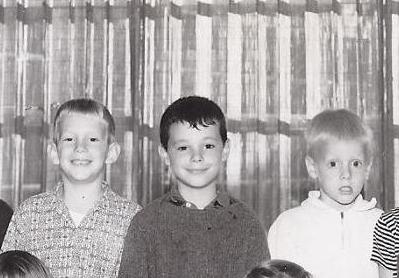A few weeks ago, Heidi Anthony from the Radcliffe Creek School emailed the Chestertown Spy to give us a heads up that the documentary filmmaker Harvey Hubbell would be showing his new film, Dislecksia, a humorous but still serious look at the learning disability, in early March. Would we care to help promote the event, she inquired.
With the Spy’s commitment to screening educational documentaries for the community throughout the year, such as Food Inc. with Colchester Farms CSA and Play Again with Echo Hill Outdoor School, I immediately said yes in response, but only later did it dawn on me that I had more than a passing interest in this particular subject.
In fact, I was perhaps one of the first of a new generation of dyslexics who were actually given that definitive diagnosis in the early 1960s. In my case, Northwestern University, just a few miles south of where we lived, bestowed that grand title on me in 1963 in a little ceremony that included only myself, my mother, and the doctor. My mother recalls that, concluding my final test of the day, the specialist listed recent advances in the field of learning disabilities while an assistant wiped down my head with rubbing alcohol after removing brainwave cables. Nonetheless, the good doctor also recommended that my Harvard-educated mother prepare herself for a son perhaps better suited for the vocation of plumbing than the law.
The truth was that no one, particularly not that very nice lady, had a clue how this kind of condition would affect my long term future. But to me, aged nine, the short term future was very predictable – I was going to get beat up.
In kid terms, the thing I heard was that I was going to be pulled from my classmates in the afternoons and sent to an “opportunity room,” located near the building’s heating furnace in the basement. It might as well have been a hall pass to Dante’s hell.
Day after day, finding my inner James Bond, I would dodge into bathrooms or chat aimlessly with a school secretary during the break between classes, strategically waiting for friends to return to their homerooms before I descended the back stairs to join Mrs. Rudolph and the five other unlucky souls given this life-altering prison term. It was only a matter of time before we would be required to wear an armband with the word “loser” sewed in like a Boy Scout merit badge.
But, as they say, things do get better. I was never picked on or called names. After two years in Mrs. Rudolph’s class, I rejoined my peers in middle school and then in high school. To my mother’s amusement and disbelief, I was able to keep up academically at demanding schools like Washington College and Connecticut College. And, finally, I had a steady career in the nonprofit sector at equally tough organizations such as the Nature Conservancy and UC Berkeley before starting a second career in the newspaper business in 2009.
This is not a rare kind of journey for those with dyslexia. In fact, success is more the norm for children who are diagnosed and given options on how they learn. The more we know about kids with learning disabilities, the more the conversation shifts from talking about a lack of ability to one about how children learn differently.
Since those dark days at Crow Island School almost fifty years ago, the painful stigma has been lifted precisely because of greater awareness created by filmmakers like Harvey Hubbell as well as institutions like Radcliffe Creek School. How the world has changed in fifty years.
The community is invited to special program on March 7, when Dislecksia will be shown at 7:00 p.m. in the Decker Theatre, Gibson Center for the Arts, on the College campus. The movie will be followed by a panel discussion with the film’s award-winning director, Harvey Hubbell V, and other special guests with expertise in dyslexia, including teachers, parents and students.
..





Write a Letter to the Editor on this Article
We encourage readers to offer their point of view on this article by submitting the following form. Editing is sometimes necessary and is done at the discretion of the editorial staff.